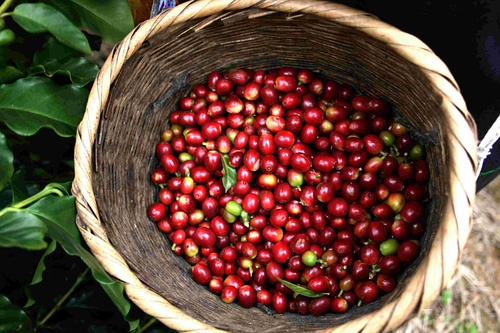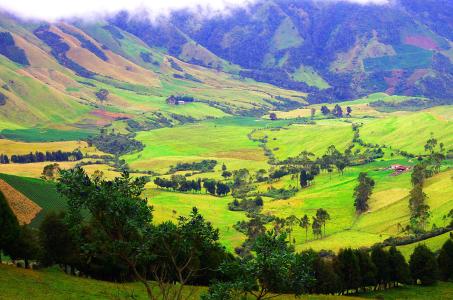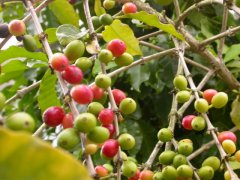Why doesn't the coffee smell good? Decrypt the secret of coffee aroma!
Professional barista communication, please pay attention to coffee workshop (Weixin Official Accounts cafe_style)

Coffee smells good, but it doesn't taste that good?
Coffee, the most fragrant drink in the world It is no exaggeration to say that coffee is the most fragrant drink in the human world.
There are more than 800 aromatic compounds that have been studied by scientists, most of which are volatile aromas. Less water-soluble aroma. There are also some compounds that have both volatile and water-soluble properties. Therefore, it smells good and tastes less fragrant. It is an indisputable fact that cannot be changed.
Even so, it is still possible to add fragrance by developing one's own potential. How can it be done?
The Secret of Coffee Aroma
Coffee beans smell good? Every living thing is a chemical warehouse. To obtain food, through a series of chemical processes in the tissues of the body, to sustain life.
This is the same for both animals and plants.
The same is true of green coffee beans, the seeds of coffee fruits.
After the coffee tree absorbs sunlight, air, water and soil nutrients, after a series of chemical reactions, different compounds will be generated and stored on the coffee beans. If it is a volatile aromatic compound, it can bring the aroma of the coffee beans.
This is also the main reason why even the same coffee tree species, different planting environment, can produce very different changes.
In fact, from the aroma quality and intensity emitted by coffee beans, coffee beans can also be distinguished from good or bad.
The aroma source of coffee ripe beans Coffee green beans must be properly roasted to brew coffee drinks suitable for us Roasted ripe beans,
Aroma is much more than raw beans, the secret lies in the high temperature environment, the two major chemical reactions triggered, Mena reaction and caramelization first start, but also the deepest impact is Mena reaction.
Mena reaction:
It is the chemical change of monosaccharide and amino acid, and the fragrance and taste of coffee mainly come from this.
Amino acids are the components of protein, and protein components account for more than 10% of the weight of raw beans. Coffee sugar is mostly in the form of sucrose. During baking and heating, sucrose will be degraded into monosaccharides, while protein will be degraded into amino acids.
Arabica has almost the same protein composition as the less flavorful Robusta, so the flavor difference between the two lies in the amount of sucrose.
Sucrose accounts for about 6 - 9% of Arabica raw beans, about twice as much as Robusta's 3 - 5%, which can be explained as the main reason for Arabica flavor to win.
Even the same Arabica species, poorer varieties and lower-altitude plants don't have as much sucrose as the better varieties and higher-altitude plants, let alone immature or defective beans, which is why bean hunters and coffee experts are so focused on coffee varieties and growing environments, and why the specialty coffee industry is looking for low-defect green beans.

Caramelization reaction:
The second important reaction that affects coffee flavor is this reaction. At high baking temperatures, sucrose dries to release carbon dioxide, darkens in color, and produces aromatic substances. Over-roasting or under-roasting produces a bad taste. Under-roasting, coffee lacks aroma. Over-roasting, too much carbonation, too much bitterness.
Important Notice :
前街咖啡 FrontStreet Coffee has moved to new addredd:
FrontStreet Coffee Address: 315,Donghua East Road,GuangZhou
Tel:020 38364473
- Prev

Illustrating the effect of coffee tree planting altitude on coffee flavor why high-quality coffee beans are at high altitude
Professional baristas Please follow the Coffee Workshop (official Wechat account cafe_style) when it comes to the growing conditions for good coffee, high altitude is often mentioned. Simply looking at the picture only helps to understand that coffee beans grown at high altitude can show more good taste after proper roasting. As for why there are these differences? Take a look at the following analysis. Coffee flavor by altitude
- Next

Coffee taste six melodies perfectly feel every change in the flavor of the coffee liquid
Professional baristas Please follow the coffee workshop (official Wechat account cafe_style) to taste coffee. After understanding the source of coffee aroma, it is time to discuss ways to taste coffee. Follow and proficient in the following six tips, you are a very professional coffee taster. The first step, smell dried incense (fragrance) as mentioned earlier, the aromatic compounds of coffee
Related
- Beginners will see the "Coffee pull flower" guide!
- What is the difference between ice blog purified milk and ordinary milk coffee?
- Why is the Philippines the largest producer of crops in Liberia?
- For coffee extraction, should the fine powder be retained?
- How does extracted espresso fill pressed powder? How much strength does it take to press the powder?
- How to make jasmine cold extract coffee? Is the jasmine + latte good?
- Will this little toy really make the coffee taste better? How does Lily Drip affect coffee extraction?
- Will the action of slapping the filter cup also affect coffee extraction?
- What's the difference between powder-to-water ratio and powder-to-liquid ratio?
- What is the Ethiopian local species? What does it have to do with Heirloom native species?

